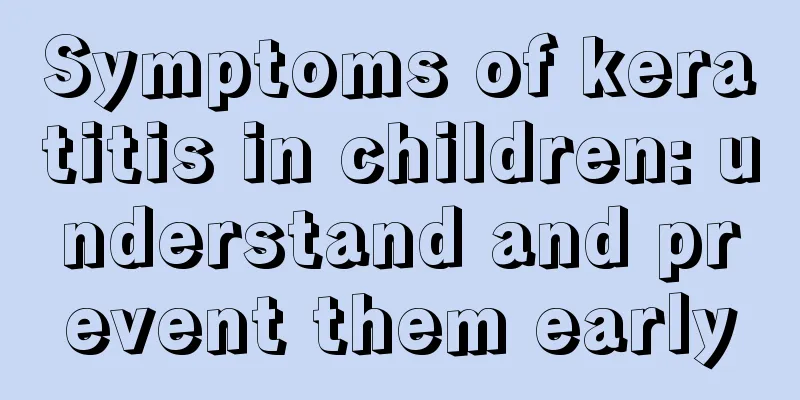Reasons why children lose their temper

|
Some children easily develop bad habits as they grow up, and some parents always complain that their children have bad tempers. As long as the baby's wishes are not followed, they will cry and make a fuss, and lose their temper. Many parents are troubled by this. Why do babies have this phenomenon? What should parents do? Let's analyze the reasons why babies lose their temper and some ways for parents to guide them! 1. Getting angry because needs are not met Due to their parents' doting, some children will cry and make a fuss when they are not satisfied. Parents should never give in or encourage this, otherwise it will encourage the child's temper. The simplest way is to put him alone in a room, isolate him for a short period of time, ignore him for a while, and give him time to calm down and reconsider what to do next. Even outside. After repeating this several times, the child will feel that it is meaningless to lose temper and cry, and that he or she cannot get the attention of the parents or what he or she wants. Gradually, he or she will stop losing temper. After each attack subsides, parents should remember to reason with their children and provide the following education in a timely manner. You should tell your child that his or her behavior just now was not good, and that losing your temper to force your parents to meet your needs will not achieve your goal. Let children know that their parents still love them, but just don’t like their throwing tantrums. This can not only educate children to stop making trouble in the future, but also prevent children from becoming alienated from their parents. What should I do if my child often loses his temper? 2. Throwing tantrums due to being ignored For such children, comfort them and divert their attention. The younger the child, the more unstable his emotions are and the easier it is for his attention to be diverted. When unpleasant things happen, use activity diversion to allow them to vent their inner tension through games or sports activities. For example, the child misses his mother, but the mother is working overtime and has not come home yet. The child feels very aggrieved and throws things around, and no amount of persuasion will help him. At this time, family members can consciously bring up something that the child is most interested in to divert the child's attention. For example, tell your child a favorite and interesting story, or take your child to play his or her favorite swing game, etc. You must start from love, comfort him emotionally, and coax the child not to cry; be patient, never scold or blame, and never get angry or beat him. Otherwise, the child's temper will only get worse. 3. Getting angry because you are not understood Children over the age of 3 already have their own thoughts and opinions on certain things. Parents must provide their children with opportunities to fully express their inner thoughts. Sometimes when children are chattering on and on about something interesting to their parents, the parents are often busy with their own things and just nod or hum indifferently, which makes the children very annoyed. Therefore, parents may wish to temporarily put down what they are doing, listen to their children with a focused look, understand their children's words with an appreciative attitude, and chat and talk to their children with interest. This will be a great support and encouragement to their children. 4. Getting angry because you can’t delay gratification Most preschool children simply do not have the patience to wait any longer for something they want to eat or play with, especially if the temptation is right in front of them. There was once a psychology experiment in which young children were required to wait for 15 minutes in order to get delicious candy. Otherwise, they would only get unpalatable candy. As a result, the children's performance varied depending on the experimental conditions; when the candy was not in front of them, the children could wait the longest; when one kind of candy (delicious or not) was in front of them, the children could wait for half the time; when both kinds of candy were in front of them, the children could wait for the shortest time. This shows that young children find it difficult to resist temptations in front of them and have weak self-control. Therefore, as parents, we must consciously train our children's ability to delay gratification on a daily basis, starting with small things. Don't let your children learn that as long as I want something, my parents will satisfy it immediately, forming a feeling of getting whatever I want. In this way, when children occasionally fail to get what they want, they are likely to get angry. The above is our detailed analysis of the reasons why babies always lose their temper. In addition to the above reasons why children have these phenomena, parents also play an important role. They should pay more attention to their own words and deeds, give their children more patience and guidance, and I believe that the baby will slowly get rid of this bad habit. |
<<: How to treat pinched foot syndrome
>>: Can babies eat yogurt at seven months old?
Recommend
What to do if your child has a lot of yellow eye mucus
I know that newborns have many organs that are gr...
How to care for children with purulent tonsillitis
In our daily lives, children are more likely to g...
Treatment for a six-month-old baby who has not grown teeth
Nowadays, the physical fitness of many newborn ba...
What medicine should children take for bronchitis
Young children are young and sometimes have poor ...
Is the sand that children play with poisonous?
With the improvement of people's living stand...
What should I do if my five-month-old baby has diarrhea?
It is inevitable that babies will get sick during...
Can children with body odor use topical medications?
Body odor is usually more obvious after exercise ...
What to do if a 1-year-old baby doesn't like to eat?
After four months, the baby starts to gradually a...
Can children take antiviral drugs in emergency room?
Infants and young children generally have low bod...
The baby of more than ten days old keeps sneezing
For some newborns, they are very easy to get sick...
What should children eat to grow taller?
Most parents want their children to have a tall s...
Causes of hot soles of children's feet
Children's bodies are relatively weak and are...
10 Tips for Treating Picky Eating in Children
Nowadays, many children are picky eaters, which is...
How to choose a newborn pillow
You must be careful when choosing a pillow for a ...
What are the dangers of laser surgery for children with myopia? What should we do if children have myopia?
Many parents do not want their children to become...









